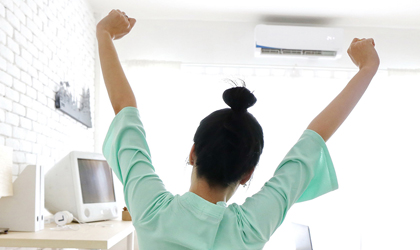
Living with physical discomfort can often come between sleep. But, as with most aspects of health and wellbeing, sleep is fundamental to managing discomfort. It’s a frustrating cycle to find yourself in. Don’t be disheartened; there are still plenty of ways to support sleep when you’re dealing with bothersome pangs and niggles.
How does physical discomfort affect sleep?
Aside from making it harder to relax into sleep, physical discomfort can also lead to shorter overall sleep time and frequent night-time awakenings (1). Stirring during the night can disrupt the natural progression of the sleep stages (light sleep, slow-wave sleep, and rapid eye movement), which you need to transition through to feel well-rested and balanced. If your sleep is disrupted due to physical discomfort, you will feel lethargic and un-refreshed the following day.
The relationship between sleep and physical discomfort is complex. If you live with discomfort, it’s not uncommon to find yourself in a cycle of anxiety, low mood, insomnia and more discomfort. You may, for instance, become exasperated and anxious when you can’t sleep. You may have a broken night’s sleep and wake in the morning feeling despondent, irritated, and stressed, which can increase sensitivity to physical discomfort (2). The following night, you may experience more discomfort, disrupting sleep and continuing the cycle.
It’s an infuriating chicken-and-egg situation: physical discomfort disturbs sleep and restless sleep causes more discomfort the following day.
How to improve your sleep hygiene
Improving your sleep requires a holistic approach. Here are some of the best ways to support sleep when experiencing physical discomfort.
Get enough morning light
Preparing your body for sleep should start as soon as you wake up. Flooding your brain with natural morning light helps calibrate your circadian rhythm (24-hour body clock). You could enjoy your coffee in the garden, walk part of the way to work, or have breakfast by a window. Try to avoid wearing sunglasses first thing, too, to avoid the damaging effects of sunlight. Since the sun's rays usually aren't strong enough early in the morning to cause damage, shielding them from this ambient light can disrupt your circadian rhythm, just avoid looking directly at the sun.
Take time to wind down
Falling asleep is often compared to landing a plane; it takes time to descend. Making a conscious effort to relax before sleep is particularly important if you experience physical discomfort. Do whatever you need to unwind: fix yourself a herbal tea, indulge in an Epsom salt bath, read a book by a soft lamp, or give yourself a massage with essential oils.
Try meditation
Meditation can help downregulate your nervous system and distract you from physical discomfort before sleeping. Simply lie on your bed, close your eyes, and quietly concentrate on your thoughts without passing any judgement – just as you would notice clouds passing in the sky. If you struggle to mediate independently, don’t worry. There are plenty of meditation apps available if you need extra guidance.
Practice deep belly breathing
Deep belly breathing activates the parasympathetic nervous system, which is responsible for the ‘rest and digest’ state. Spending a few minutes intentionally breathing before bed will communicate messages of safety to your brain, even if you don’t feel it. And this may positively impact your experience of physical discomfort.
Be careful with caffeine
Caffeine and sleep famously don’t get on. Caffeine can make it harder to fall asleep, lead to frequent night-time awakenings, and affect the electrical, brain-wave quality of your sleep, meaning you’ll experience less quality sleep, wake exhausted, and probably reach for more coffee in the morning. Try to have your caffeine before midday in mild to moderate doses (less than 3 cups of coffee).
Take care with blue light
The late-night glow emanating from your gadgets is a widely known sleep-disrupter. Blue light inhibits melatonin (the sleep hormone), tricking your brain into thinking it should be awake. With this in mind, ensure your bedroom is completely dark, disconnect from all electronics 90-minutes before bed, and consider keeping technology out of your bedroom.
Supplement support for physical discomfort
Aside from making lifestyle changes to support your sleep hygiene, the following supplements may serve as useful additions.
Valerian
Valerian root has long been used for its special properties. Valerian tablets are a traditional herbal medicinal product used for the temporary relief of sleep disturbances and mild anxiety.
Magnesium
Magnesium is an essential mineral that plays an integral role in many body processes. It is often recommended by nutritionists since it contributes to the maintenance of normal muscle function.
Vitamin D3
Vitamin D3 plays an important role in muscle and bone function, making it a popular choice.
PEA
PEA belongs to a group of natural compounds which are vital for chemical signalling in the body, and it can be found in almost every cell in the body. It is naturally produced when cells are damaged or threatened. It’s a popular choice to tackle those niggles that might hold you back.
Turmeric
Turmeric has a long history of use in health and wellness. Curcumin, the natural compound found in turmeric, is said to be responsible for the spice’s properties.
Glucosamine & Chondroitin
The combination of glucosamine and chondroitin has become one of the most popular supplements with millions of people choosing to take it on a regular basis.
Omega-3s
Found in oily fish and microalgae, the long-chain omega-3 fatty acids are important for good overall health. Omega-3s are often recommended as a perfect partner to Devil’s Claw.
Devil’s Claw
Devil's Claw is a traditional herbal medicinal product used for the relief of backache, rheumatic or muscular pain, and general aches and pains in the muscles and joints.
Rosehip
Regarded as a 'super-fruit' by herbalists, rosehip is a popular choice for those who take Glucosamine or Devil’s Claw.
Want to find out more?
Read more of our resources on managing physical discomfort here. You can also reach out to our expert Nutrition Advice team to receive free nutrition advice. No matter how small your query, they’re happy to help.
Call: 01892 352927
Email: nutrition@naturesbest.co.uk
Write: Nature’s Best Ltd. Century Place, Tunbridge Wells, Kent, TN2 3BE
References:
-
Available online: https://www.ncbi.nlm.nih.gov/pmc/articles/PMC4046588/
-
Available online: https://pubmed.ncbi.nlm.nih.gov/22547894/
Related Posts

Olivia
Olivia Salter has always been an avid health nut. After graduating from the University of Bristol, she began working for a nutritional consultancy where she discovered her passion for all things wellness-related. There, she executed much of the company’s content marketing strategy and found her niche in health writing, publishing articles in Women’s Health, Mind Body Green, Thrive and Psychologies.
View More



